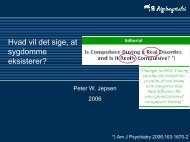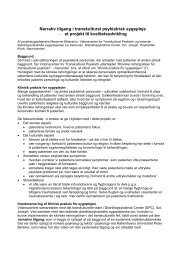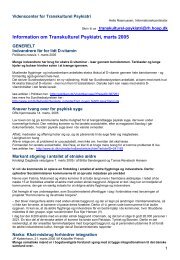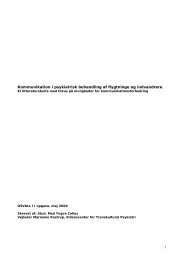Information om Transkulturel Psykiatri, marts 2009 - Videnscenter for ...
Information om Transkulturel Psykiatri, marts 2009 - Videnscenter for ...
Information om Transkulturel Psykiatri, marts 2009 - Videnscenter for ...
Create successful ePaper yourself
Turn your PDF publications into a flip-book with our unique Google optimized e-Paper software.
<strong>Videnscenter</strong> <strong>for</strong> <strong>Transkulturel</strong> <strong>Psykiatri</strong>. <strong>Psykiatri</strong>sk Center København<br />
Helle Rasmussen, <strong>In<strong>for</strong>mation</strong>skoordinator<br />
Results<br />
The most c<strong>om</strong>mon and precisely measured organizational practices reported by OSAT managers included<br />
matching providers and clients based on language/dialect; offering cross-cultural training; and fostering<br />
connections with c<strong>om</strong>munity and faith-based organizations connected to racial and ethnic minority groups.<br />
The most culturally sensitive belief among OSAT managers was support <strong>for</strong> language/dialect matching <strong>for</strong><br />
racial and ethnic minority clients. Results of regression modeling indicate that organizational practices were<br />
not related to either outc<strong>om</strong>e. However, managers‘ culturally sensitive beliefs were negatively associated<br />
with average wait time (p < 0.05), and positively associated with average retention (p < 0.01).<br />
Conclusions<br />
Managers‘ culturally sensitive beliefs—considered to be influential <strong>for</strong> effective implementation of culturally<br />
c<strong>om</strong>petent practices—may be particularly relevant in influencing wait time and retention in OSAT<br />
organizations that treat Latinos and African American clients.<br />
Keywords: Organizational cultural c<strong>om</strong>petence, Item response theory, Access, Wait time, Retention<br />
Drug and alcohol dependence 119(1-2), e13-e22, 2011<br />
Evidence-based medicine : opportunities and challenges in a diverse society<br />
Whitley, Rob; Rousseau, Cecile; Carpenter-Song, Elizabeth; Kirmayer, Laurence J.<br />
In this article we explore the discourse and practice of evidence-based medicine (EBM) in the context of<br />
social and cultural diversity. The article consists of 2 parts. First, we begin by defi ning EBM, describing its<br />
historical development and current ascendance in medical practice. We then note its importance in<br />
contemporary psychiatry, c<strong>om</strong>paring dynamics between the United States and Canada. Secondly, we offer a<br />
constructive critique of the application of EBM and evidence-based practices in the context of ethnocultural<br />
diversity, as one consistent refl ection on the EBM literature is that it is does not adequately address issues<br />
of diversity. In doing so, we use the situation here in Canada as an extended case study, though our<br />
observations will likely be applicable in other diverse nations, such as the United States, the United<br />
Kingd<strong>om</strong>, and Australia. We critically examine the following 6 issues related to the practice of EBM in a<br />
diverse society: generalizability and transferability of evidence-based interventions; diversifying standards of<br />
evidence in EBM; strategies to address diversity in EBM research; cultural adaptations of evidence-based<br />
interventions; integrating idiographic knowledge; and, training and health service delivery. Concurrent with<br />
our critique, we offer research and practice suggestions that may address outstanding challenges vis-à-vis<br />
the practice of EBM in a diverse society. These include a need <strong>for</strong> more effectiveness research, more<br />
openness to diverse sources of knowledge, better integration of idiographic and n<strong>om</strong>othetic knowledge, and<br />
a critical approach to extrapolation and transfer of knowledge.<br />
Key Words: evidence-based medicine, evidence-based practices, diversity, ethnicity, race, mental health<br />
services<br />
Canadian journal of psychiatry. 56(9), 514–522, 2011.<br />
Download artiklen her: publications.cpa-apc.org/media.php?mid=1216<br />
Depressive disorder among Turkish w<strong>om</strong>en in the Netherlands: A qualitative study<br />
of idi<strong>om</strong>s of distress<br />
Borra, Ria<br />
The provision of mental health services to immigrants in the Netherlands is hampered by difficulty in<br />
establishing valid diagnoses of psychiatric disorders. To improve the process of diagnosing depressive<br />
disorder among Turkish w<strong>om</strong>en in Dutch mental healthcare, we conducted a qualitative study of w<strong>om</strong>en with<br />
depression in Rotterdam. A bilingual Turkish–Dutch diagnostic interview was developed to explore Turkish<br />
w<strong>om</strong>en's idi<strong>om</strong>s of distress. Interviews were conducted with 20 w<strong>om</strong>en with a disputed diagnosis of<br />
depression. Results showed that distress among the Turkish w<strong>om</strong>en was characterized by a wide range of<br />
s<strong>om</strong>atic c<strong>om</strong>plaints, with anxiety and agitation occurring as frequently as depressive c<strong>om</strong>plaints. Because<br />
the range of c<strong>om</strong>plaints is so varied, major depression may be underdiagnosed in the Turkish immigrant<br />
population.<br />
Key words immigration - Turkish w<strong>om</strong>en – depression - idi<strong>om</strong>s of distress - diagnostic interview<br />
Transcultural psychiatry 48(5), 660-674, 2011<br />
3






